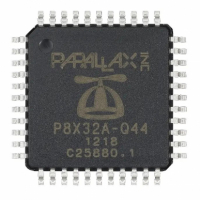Can simpletools i2c_in() and i2c_out() be used for register-based devices or only memory devices?
 Macknnations
Posts: 12
Macknnations
Posts: 12
in C/C++
I'm working with a clock generator (Si5351) that has registers and I'm not clear on how to properly use i2c_in() and i2c_out() parameters to select and read/write registers. I've read i2c_in.c, i2c_out.c, simplei2c.c.
int i2c_in(i2c *busID, int i2cAddr,
int memAddr, int memAddrCount,
unsigned char *data, int dataCount)
i2cAddr is the device address from the datasheet (0x60), but what about memAddr? Is that the register?
memAddrCount is the number of bytes to read or is dataCount ?
The Si5351 has 8-bit registers - Is the memAddr the register number?
I'm only reading one byte, right?
Any help would be appreciated.


Comments
Look at the library called simplei2c.c -- it has the low-level functions that you need to direct access to any I2C device.
On my computer the library is in this folder:
-- C:\Users\jmcph\Documents\SimpleIDE\Learn\Simple Libraries\Protocol\libsimplei2c
Thanks for the reply, @JonnyMac.
I've pored over that and simplei2c.c The low-level functions in libsimplei2c.c and the higher-level functions in i2c_in and i2c_out all assume memory devices with large multi-byte addresses. They endianSwap or shift right by 8 bits whatever address is sent in the address field and send multiple bytes for the address which doesn't make sense if the address is a one-byte register address. The data sheet for the clock generator shows only single byte addresses for register queries using i2c. I don't need to send multiple bytes for the register address.
I kinda suspected trouble when I saw all those functions where prefixed with ee_ (eeprom functions)
I think I'll need to just pick out the appropriate elements and build my own functions for this device.
That how I do it (in Spin). I have a basic I2C library that does start(), write(), read(), and stop(), etc. -- individual component libraries are built on top of that. I've attached an example. Again, this is Spin, but you can see how the functions/methods work. I like I2C; if you have good documentation it's pretty easy to build a component library.
Even though I'm not versed in Spin, I can understand most of it - Some really helpful code in those documents.
The wr_reg(), and rd_reg() functions are spot on for what I'm trying to accomplish. The read() and write() boil it down to bytes which is what I was trying to accomplish. The readByte() and writeByte() from the simplei2c.c mirror your code including the clock stretching - I'm fairly sure this is exactly what I needed.
Thank you.
I'll keep at it and let you know how it goes.
Glad I could help.